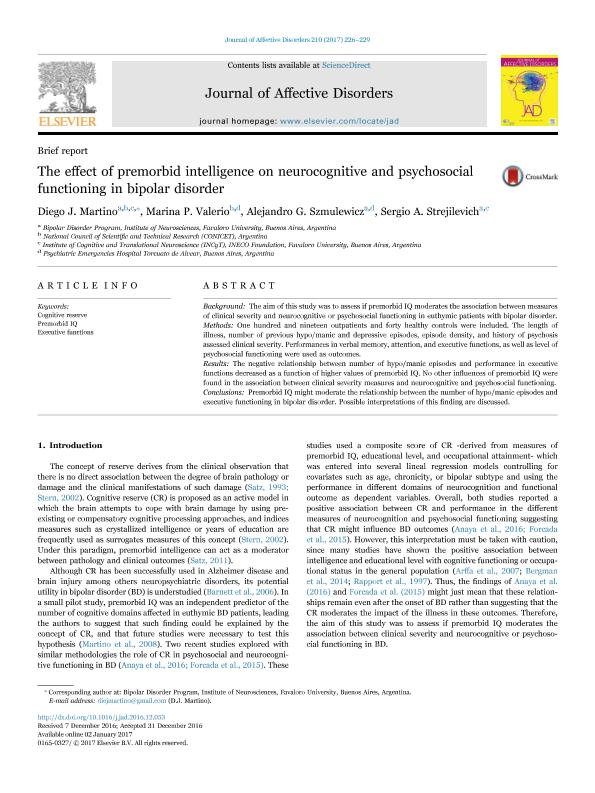Artículo
The effect of premorbid intelligence on neurocognitive and psychosocial functioning in bipolar disorder
Fecha de publicación:
03/2017
Editorial:
Elsevier Science
Revista:
Journal of Affective Disorders
ISSN:
0165-0327
Idioma:
Inglés
Tipo de recurso:
Artículo publicado
Clasificación temática:
Resumen
Background: The aim of this study was to assess if premorbid IQ moderates the association between measuresof clinical severity and neurocognitive or psychosocial functioning in euthymic patients with bipolar disorder.Methods: One hundred and nineteen outpatients and forty healthy controls were included. The length ofillness, number of previous hypo/manic and depressive episodes, episode density, and history of psychosisassessed clinical severity. Performances in verbal memory, attention, and executive functions, as well as level ofpsychosocial functioning were used as outcomes.Results: The negative relationship between number of hypo/manic episodes and performance in executivefunctions decreased as a function of higher values of premorbid IQ. No other influences of premorbid IQ werefound in the association between clinical severity measures and neurocognitive and psychosocial functioning.Conclusions: Premorbid IQ might moderate the relationship between the number of hypo/manic episodes andexecutive functioning in bipolar disorder. Possible interpretations of this finding are discussed.
Palabras clave:
Cognitive Reserve
,
Executive Functions
,
Premorbid Iq
Archivos asociados
Licencia
Identificadores
Colecciones
Articulos(OCA HOUSSAY)
Articulos de OFICINA DE COORDINACION ADMINISTRATIVA HOUSSAY
Articulos de OFICINA DE COORDINACION ADMINISTRATIVA HOUSSAY
Citación
Martino, Diego Javier; Valerio, Marina Paula; Szmulewicz, Alejandro G.; Strejilevich, Sergio; The effect of premorbid intelligence on neurocognitive and psychosocial functioning in bipolar disorder; Elsevier Science; Journal of Affective Disorders; 210; 3-2017; 226-229
Compartir
Altmétricas




